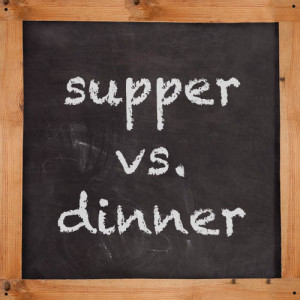 Sometimes we correct one another based on our experience and culture rather than on solid data. For instance, I might ask you to go out to Sunday Dinner. I mean … “Church is over, let’s go eat.” I grew up referring to the mid-day meal (especially on Sunday) as dinner. Others insist, that dinner
Sometimes we correct one another based on our experience and culture rather than on solid data. For instance, I might ask you to go out to Sunday Dinner. I mean … “Church is over, let’s go eat.” I grew up referring to the mid-day meal (especially on Sunday) as dinner. Others insist, that dinner Supper does refer to the evening meal; no debate. It comes from the old French souper which literally means “evening meal.” Linguistically, it has ties back to the evening meal that Jesus shared with his disciples the night he was betrayed.
Dinner (now hold onto your seats) comes from the Latin disj?j?n?re meaning “to break one’s fast.” What!? Dinner means breakfast? No … it was never used that way. It has traditionally referred to the largest meal of the day, either lunch or supper. How you use the word dinner may reveal something about your ancestral roots. People with rural agricultural ties are much more likely to refer to the mid-day meal as dinner. Because, that’s when they had their largest meal. In the late 1800s, Noah Webster wrote, “The dinner of fashionable people would be the supper of rustics.” I’m a rustic … but I’m a linguistically vindicated rustic. If I ask you to Sunday Dinner at Noon and you correct me … that’s okay, you’re still invited.
Sometimes we judge sin based on our experience and culture rather than on the solid foundation of God’s Word. Growing up, I heard that it was a sin for a man to pluck his eyebrows. This caused me great consternation since I had witnessed a couple of generations of untamed brows. Funny thing is, that’s nowhere in the Bible. It is in the Quran, but not the Bible.
The Bible really does identify certain actions as sin (Exodus 20; Colossians 3:5-6). The Bible also says that we’re to confront in order to restore when we see a brother or sister sinning (Luke 17:3; Galatians 6:1; Hebrews 3:12). Just remember … God’s Word must be the deciding rule by which we identify sinful actions, not culture or tradition.

